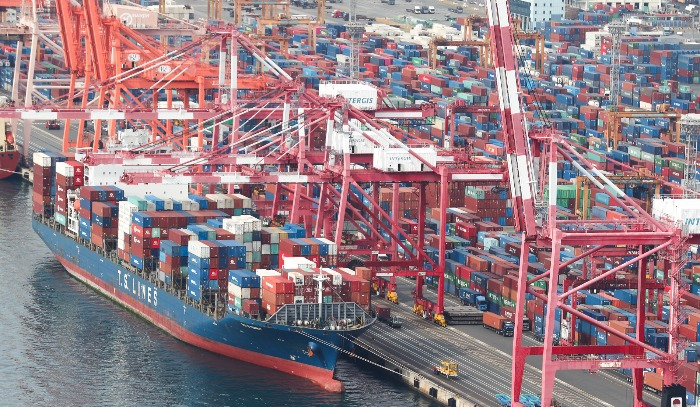Economy
OECD cuts Korea's economic growth forecast for next year to 1.8%
The 2023 outlook blames high inflation and interest rates for eroding the nation's economic expansion
By Nov 23, 2022 (Gmt+09:00)
2
Min read
Most Read
LG Chem to sell water filter business to Glenwood PE for $692 million


Kyobo Life poised to buy Japan’s SBI Group-owned savings bank


KT&G eyes overseas M&A after rejecting activist fund's offer


StockX in merger talks with Naver’s online reseller Kream


Mirae Asset to be named Korea Post’s core real estate fund operator



The Organisation for Economic Development and Co-operation (OECD) has cut its forecast for South Korea's economic growth next year to 1.8%, down from its 2.2% projection made in September. Global economic recovery is expected from 2024, and Korea is expected to see growth in the 1% range until then.
In its global economic outlook released on Tuesday, the OECD said the Korean economy will grow in the 1% range, the first by any major international organization. Last month, the International Monetary Fund gave a prediction of 2% for Korea next year and the Asian Development Bank (ADB) 2.3% in September.
Among domestic think tanks, the Korea Development Institute forecast 1.8% on Nov. 10 and the Korea Institute of Finance 1.7% on Nov. 8.
The OECD cut its projection for Korea but maintained that for the global economy at the September rate of 2.2%, implying a more negative situation for the country than other economies.
The outlook also predicted that Korea's growth in 2024 (1.9%) will trail that of the world (2.7%). Since the Bank of Korea in 1954 started tracking economic growth, the domestic economy has never seen two straight years of under 1% growth over 68 years. The Korean economy shrank 1.6% in 1980 due to an oil shock, 5.1% in 1998 because of the Asian financial crisis, 0.8% in 2009 in the aftermath of the 2008 global financial crisis and 0.7% in 2020 after the COVID-19 outbreak. In all four crises, however, growth of under 1% lasted just a year.
The OECD said the Korean economy has lost growth momentum due to lower private consumption due to high inflation and interest rates and contractionary pressure on exports amid slowing global demand. The rising burden of debt servicing is a risk that will expedite price corrections on the housing price market and lead to corporate defaults, it warned.
The report added that trade protectionism stemming from Sino-US economic competition and geopolitical tensions like the Russian invasion of Ukraine could serve as factors that reorganize the supply chains to which Korea belongs.
The OECD also advised Seoul to maintain a tight monetary policy to stabilize inflation expectations. The organization's outlook maintained its forecast for the country's inflation next year at September's rate of 3.9% and predicted 2.3% in 2024, considerably lower than its world projections of 6% and 5.4%, respectively.
Write to Eu-Jin Jeong at justjin@hankyung.com
More to Read
-
 EconomyKDI cuts Korea growth forecast, urges gradual rate hikes
EconomyKDI cuts Korea growth forecast, urges gradual rate hikesNov 11, 2022 (Gmt+09:00)
2 Min read -
 EconomyADB cuts Korea’s 2023 growth outlook as trade in deficit for sixth month
EconomyADB cuts Korea’s 2023 growth outlook as trade in deficit for sixth monthSep 21, 2022 (Gmt+09:00)
3 Min read -

-
 EconomyKorea inflation hits highest point since 1998 crisis, BOK to hike rates
EconomyKorea inflation hits highest point since 1998 crisis, BOK to hike ratesAug 02, 2022 (Gmt+09:00)
3 Min read -

Comment 0
LOG IN


